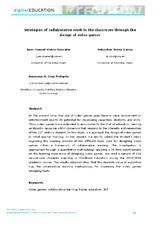Mostrar el registro sencillo del ítem
Strategies of collaborative work in the classroom through the design of video games
| dc.contributor.author | Muñoz González, Juan Manuel | |
| dc.contributor.author | Rubio García, Sebastián | |
| dc.contributor.author | Cruz Pichardo, Ivanovna | |
| dc.date.accessioned | 2019-02-04T11:09:09Z | |
| dc.date.available | 2019-02-04T11:09:09Z | |
| dc.date.issued | 2015 | |
| dc.identifier.uri | http://hdl.handle.net/10396/17757 | |
| dc.description.abstract | At the present time, the use of video games goes beyond mere amusement or entertainment due to its potential for developing capacities, dexterity and skills. Thus, video games have extended to environments like that of education, serving as didactic resources within dynamics that respond to the interests and necessities of the 21st century student. In this study, we approach the design of video games in initial teacher training. In this respect, we aim to collect the student’s views regarding the learning process of the different tools used for designing video games within a framework of collaborative learning. The investigation is approached through a quantitative methodology applying a 28-item questionnaire on the learning experience of designing video games. We used a sample of 200 second-year students majoring in Childhood Education during the 2013/2014 academic course. The results obtained show that the students value in a positive way the collaborative learning methodology for mastering the video games designing tools. | es_ES |
| dc.description.abstract | En la actualidad, el uso de los videojuegos va más allá de la mera diversión o entreteniendo, debido a su potencial para el desarrollo de capacidades, destrezas y habilidades. Por tanto, los videojuegos se han extendido a ámbitos como el de la educación, empleándose como recursos didácticos dentro de dinámicas que responden a los intereses y necesidades del alumnado del siglo XXI. En este estudio, abordamos el diseño de videojuegos en la formación inicial docente. Al respecto, pretendemos recoger las opiniones del alumnado en relación al aprendizaje de las distintas herramientas empleadas para el diseño de videojuegos en el marco del aprendizaje colaborativo. La investigación la abordamos desde una metodología cuantitativa, a través del uso de un cuestionario de 28 items, sobre la experiencia de aprendizaje vivida en el diseño de videojuegos. Se ha trabajado con una muestra de 200 estudiantes pertenecientes al segundo curso de la titulación de Grado de Maestro especialidad en Educación Infantil, durante el curso académico 2013/2014. Los resultados obtenidos muestran que el alumnado valora positivamente la metodología del aprendizaje colaborativo para la adquisición del dominio de las herramientas utilizadas en el diseño de videojuegos. | es_ES |
| dc.format.mimetype | application/pdf | es_ES |
| dc.language.iso | eng | es_ES |
| dc.publisher | Universidad de Barcelona | es_ES |
| dc.rights | https://creativecommons.org/licenses/by-nc-nd/4.0/ | es_ES |
| dc.source | Digital Education Review 27, 69-84 (2015) | es_ES |
| dc.subject | Videojuegos | es_ES |
| dc.subject | Aprendizaje colaborativo | es_ES |
| dc.subject | Educación superior | es_ES |
| dc.subject | TIC | es_ES |
| dc.subject | Video games | es_ES |
| dc.subject | Collaborative learning | es_ES |
| dc.subject | Higher education | es_ES |
| dc.subject | ICT | es_ES |
| dc.title | Strategies of collaborative work in the classroom through the design of video games | es_ES |
| dc.type | info:eu-repo/semantics/article | es_ES |
| dc.relation.publisherversion | http://revistes.ub.edu/index.php/der/article/view/11914 | es_ES |
| dc.rights.accessRights | info:eu-repo/semantics/openAccess | es_ES |

